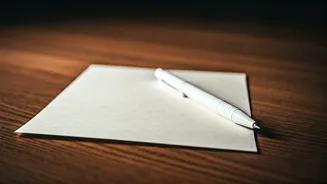Understanding Overthinking's Grip
Overthinking, a pervasive issue affecting countless individuals, manifests as an incessant stream of repetitive and often negative thoughts. These thoughts can
occupy your mind, affecting your emotional well-being and potentially leading to anxiety, stress, and insomnia. This mental pattern can also influence cognitive functions, such as concentration and decision-making. Recognizing overthinking is the first step toward addressing it. Common signs include dwelling on past events, worrying excessively about the future, and struggling to switch off your mind at night. Many people report feeling overwhelmed by their thoughts, which can disrupt daily activities and diminish overall quality of life. The need to find practical and effective strategies to counter this mental habit is critical for mental health.
The Pen-and-Paper Solution
The simple, yet powerful, technique introduced by the sleep specialist involves the use of a pen and paper. The core principle revolves around externalizing thoughts to lessen their influence. To utilize this method, you should designate a time, possibly before bed, to write down everything occupying your mind. It can include your concerns, random thoughts, or anything troubling you. You can write it all down, without any need to impose structure or organization. The act of physically writing down your thoughts can provide a sense of control and allows your mind to de-clutter. It is also believed that by putting these thoughts down, you are no longer holding them in your mind and are letting them go. This exercise usually helps with achieving a state of mental calm that can contribute towards better sleep.
Implementing the Technique
To effectively implement the pen-and-paper technique, set aside dedicated time each day, preferably in the evening. Begin by finding a quiet space free from distractions. Grab a pen and paper and start writing down any thoughts, worries, or ideas. The key is to be as honest as possible. Avoid censoring your thoughts; simply allow them to flow onto the paper. It is not necessary to write in perfect sentences or adhere to any specific structure; the goal is to empty your mind. After writing everything down, take a moment to read it over, and then set the paper aside. You can choose to destroy it, store it, or simply leave it. With practice, the practice of writing can help you identify thought patterns, manage your emotions, and ultimately promote mental clarity. Consistency is key to unlocking the full potential of this simple yet effective method.
Benefits and Outcomes
The consistent use of the pen-and-paper technique brings a series of potential benefits. Many individuals report feeling less anxious and stressed after writing down their thoughts. The externalization process can create a distance from troubling thoughts, reducing their intensity. This technique can also lead to improved sleep quality, as a clear mind is often linked to falling asleep faster and experiencing fewer disruptions during the night. The practice of writing allows for identifying recurring thought patterns, providing valuable insights into potential triggers or areas of concern. This self-awareness can empower you to proactively address the underlying causes of overthinking. Over time, this technique becomes a readily available tool to manage stress and increase overall mental resilience, which ultimately has a positive effect on your mental health.
Making It a Habit
Making this technique a consistent part of your daily routine takes a bit of commitment. Start by scheduling a regular time to write, ideally at the end of the day or before bed. Make it a habit by linking it to another existing activity, like brushing your teeth or drinking a cup of tea. Keep your pen and paper readily accessible, so it is easy to start the practice. The key to consistency is to make it convenient. Embrace the practice even on days you don't feel like it. Sometimes, the most effective writing sessions are when you feel the most resistant. Don’t worry about perfection; there is no right or wrong way to do it. The goal is to clear your mind, not to produce literary masterpieces. By developing a regular writing habit, you will gradually transform it into an integral part of your self-care routine, ultimately enhancing your mental health.
Beyond Pen and Paper
While the pen-and-paper method is highly effective, it is also good to integrate other practices into your routine to boost mental well-being. Consider combining journaling with relaxation techniques, such as deep breathing exercises or meditation. Physical exercise can be a great way to relieve stress and improve mental clarity. Engaging in activities that bring you joy can counter negative thoughts and promote positive emotions. Make sure you get enough sleep, as sleep deprivation can worsen overthinking. A healthy diet, rich in nutrients, can also support brain function and mental health. Consulting a healthcare professional can give you more specific advice and tailored strategies. By combining the pen-and-paper technique with other healthy habits, you create a robust approach to managing overthinking and promoting overall wellness.















